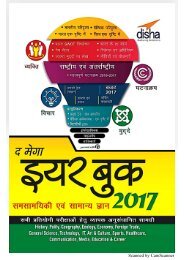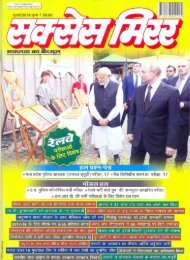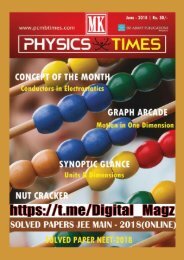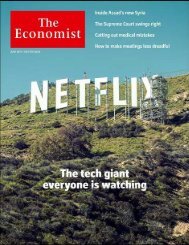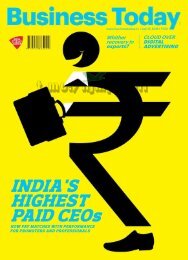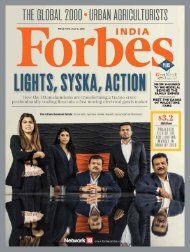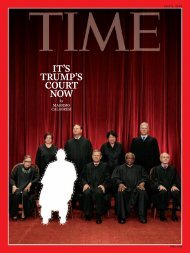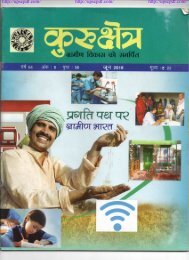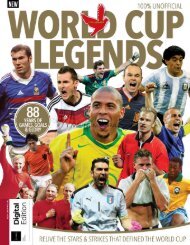Fortune
You also want an ePaper? Increase the reach of your titles
YUMPU automatically turns print PDFs into web optimized ePapers that Google loves.
THE DATING GAME<br />
B<br />
OTH COMPANIES WOULD soon be hit with<br />
a much bigger tsunami of news on<br />
May 8, when Zuckerberg made his<br />
announcement. “All of a sudden, he<br />
starts saying, ‘Did you know that one in three<br />
marriages in the U.S. start online?’ ” recalls<br />
Jeferies Internet analyst Brent Thill, who<br />
was in the F8 audience that day. “And I’m<br />
like, ‘Oh, no, here comes the dating app.’ ” In<br />
his presentation, Zuckerberg said that the<br />
Facebook feature would be “for building real,<br />
long-term relationships, not just hookups,” a<br />
dig at Tinder.<br />
Facebook has been light on actual details<br />
but says the opt-in feature will match users<br />
with people they aren’t already friends with,<br />
and that users will be able to create a separate<br />
dating profile that friends won’t be able to see.<br />
Ginsberg addressed the issue on Match’s<br />
earnings call the following week. Research<br />
suggests the majority of singles—especially<br />
women—would not want to use Facebook for<br />
dating, she told investors. Users have concerns<br />
over both privacy and engaging in dating<br />
activities in the same place where they share<br />
updates with family and friends, she said.<br />
She also points out that the dating business<br />
is not as easy as it might seem. While<br />
Match has reams of cards and thank-you<br />
notes hung around its headquarters for every<br />
wedding and child it helped create, it also<br />
hears from plenty of users who have had bad<br />
dates and blame the company. “Part of dating<br />
is the up and down,” she says. “We live with<br />
all that psychology, and they’ll have to, too.<br />
How does that psychology play in with the relationship<br />
they have with their core product?”<br />
All these things are true, but so is the fact<br />
that a half-trillion-dollar company with 2 billion<br />
users just announced it’s getting into a<br />
field that Match has had pretty much to itself<br />
for more than two decades.<br />
One thing everyone seems to agree on is<br />
that Facebook’s efectively endorsing online<br />
dating will be a huge legitimization event<br />
for the industry. “This may actually be a<br />
pump that primes the overall market,” says<br />
Thill. Match has found that when it has gone<br />
into new overseas markets where people<br />
are already comfortable with Facebook, it<br />
reduces the barrier to entry for online dating.<br />
And the truth is, for all the drama between<br />
MATCH GROUP<br />
GLOBAL REVENUES<br />
$1.5<br />
1.0<br />
0.5<br />
0<br />
FY 2012<br />
MATCH GROUP<br />
PROFITS<br />
$400 M<br />
300<br />
200<br />
100<br />
0<br />
FY 2012<br />
FOREIGN<br />
U.S.<br />
$1.3 B<br />
2017<br />
$451.6 M<br />
2017<br />
STOCK PRICE<br />
GROWTH SINCE IPO<br />
(NOV. 18, 2015)<br />
258%<br />
SOURCE: BLOOMBERG<br />
Bumble and Match, and all the angst about<br />
Facebook’s entry, there’s a lot of room in this<br />
category: On average, people use three dating<br />
products at any given time.<br />
A<br />
FTER A FEW WEEKS test-driving both<br />
Tinder and Bumble, I conclude that I<br />
am no fan of the swipe. I find myself<br />
missing the thoughtful, epistolary<br />
correspondence of email-based dating, which,<br />
compared with this, feels almost Victorian.<br />
I also developed an aversion to the apps’<br />
location-driven approach, which draws no<br />
distinction between someone who lives in the<br />
New York City area and someone just passing<br />
through. I signed up for Bumble, for instance,<br />
while visiting friends in Boston and immediately<br />
matched with Bostonians—and then, on<br />
the Amtrak ride home, with eligible singles<br />
all up and down the New England coast.<br />
And it’s true what people say: Compared<br />
with the Match.com of yore, there is much<br />
more short-term-ism. Many profiles don’t<br />
have anything written, just photos. On Tinder,<br />
I saw a few couples looking for a threesome<br />
and a handful of married men looking for<br />
something on the side.<br />
But I found that if I was patient enough<br />
and kept swiping, there did seem to be a<br />
supply of eligible matches in my general<br />
demographic. Ultimately, that’s what really<br />
matters to daters: I may not love these apps,<br />
but if everyone in my demo is using Tinder<br />
and Bumble, then I’m going to use Tinder and<br />
Bumble. (Levin of IAC refers to this as “liquidity<br />
in the marketplace.”) Sometimes, the pack<br />
moves. Case in point: During my research for<br />
this story, someone suggested that I try the<br />
dating site Hinge, noting that it has seen a<br />
spike in use among New Yorkers.<br />
G<br />
INSBERG HERSELF NEVER did much online<br />
dating, save for a few Jdates while she<br />
was in business school. To get into the<br />
online dater’s mindset, she constantly<br />
polls singles about their experiences—including<br />
texting her 19-year-old daughter and her<br />
daughter’s friends to ask what they think<br />
of Tinder. But she knows firsthand how the<br />
excitement of a serendipitous meet-cute can<br />
change a life—and also how relationships<br />
aren’t always easy.<br />
In the early-1990s, after graduating from<br />
UC–Berkeley, Ginsberg decided to spend the<br />
summer as a counselor on a teen tour to Israel,<br />
with the intent of returning to her native Dallas<br />
afterward. But while on the trip, she fell<br />
www.t.me/velarch_official<br />
90<br />
FORTUNE.COM // JULY.1.18<br />
GRAPHIC BY NICOLAS RAPP



